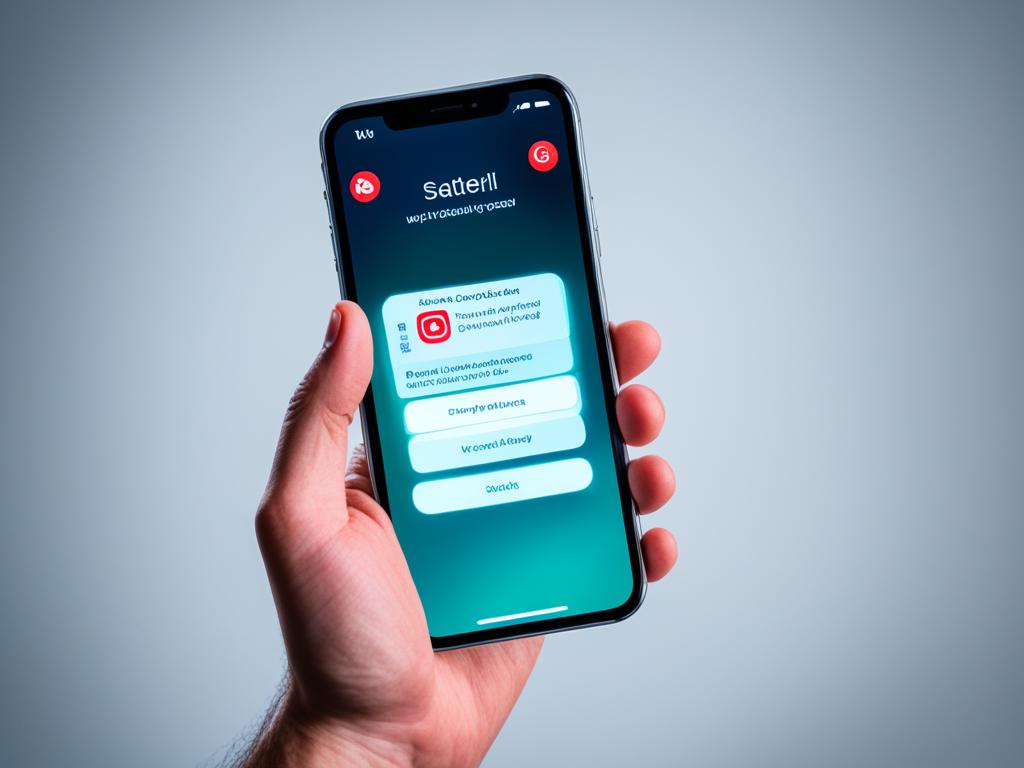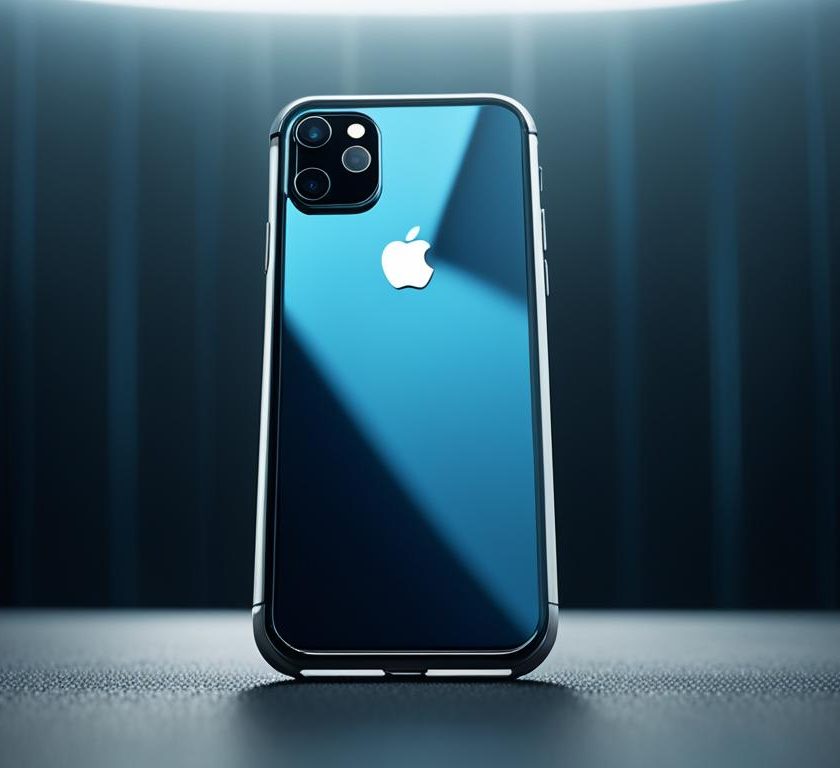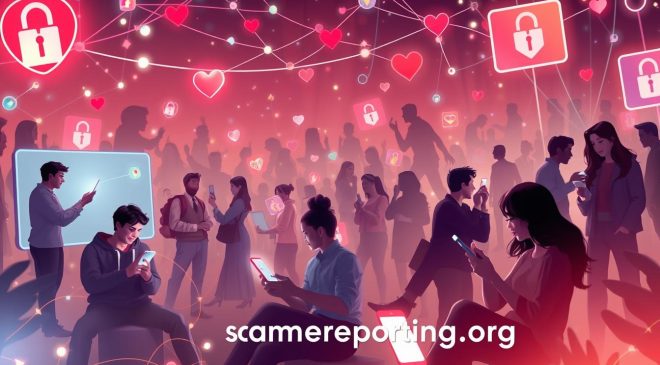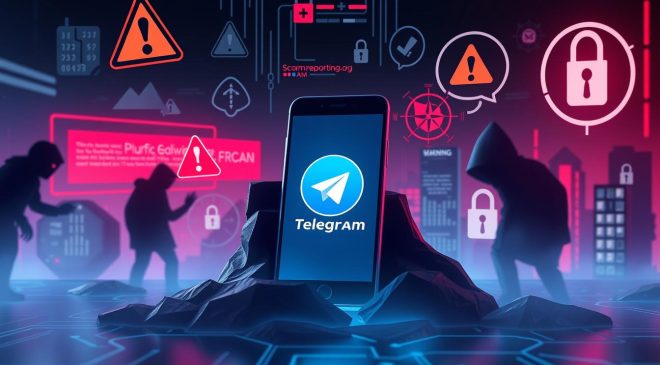
Imagine you’re enjoying your morning coffee when your iPhone buzzes with an urgent message. It says your device has been hacked. You start to worry, “Can a scammer really hack my iPhone?” This is a real concern in today’s digital world, where cyber threats are common.
In 2023, the Federal Trade Commission found that crypto scams led to $1.3 billion in losses. This shows how crucial it is to protect your iPhone from scams. With our devices playing a big role in our lives, the risk of hacking is higher than ever.
Even though iPhones are secure, they can still be vulnerable to threats. Hackers use smooth messages to trick you into sharing sensitive info. They create a sense of urgency to make you act fast without thinking.
Don’t worry, though. By learning about the risks and using strong security steps, you can protect your iPhone from scams and hacking. Let’s explore iPhone security together and give you the tools to keep your device safe.
Key Takeaways
- iPhone users face various security threats, including sophisticated scams and hacking attempts.
- The FTC reported $1.3 billion in crypto scam losses in 2023, highlighting the need for vigilance.
- Scammers often use urgent messages and polished tactics to trick users.
- Strong passwords, two-factor authentication, and regular updates are crucial for iPhone security.
- Understanding common scam techniques can help you protect your personal and financial information.
Understanding iPhone Security Threats
Your iPhone is a powerful device, but it’s not safe from cyber threats. Scammers use many ways to find iPhone weaknesses and get your personal info. Let’s explore iPhone security risks and how to protect yourself.
Common iPhone Vulnerabilities
iPhones have security issues. Unfixed software bugs can make your device vulnerable. For instance, a hidden Android app called Showcase.apk could give deep access to Google Pixel phones. This doesn’t affect iPhones, but it shows why keeping your software updated is key.
Types of Scams Targeting iPhone Users
Scammers use many ways to target iPhone users. These include:
- Phishing attacks through emails or text messages
- Fake apps that mimic legitimate ones
- Unsecured Wi-Fi networks that can intercept your data
A recent data breach at National Public Data exposed 2.9 billion records, including names, addresses, and Social Security numbers. This shows how your info can be at risk, even when stored by others.
The Role of Social Engineering in iPhone Hacks
Social engineering is key in many iPhone hacks. Scammers trick users into sharing sensitive info or giving access to their devices. They might pretend to be tech support, a bank rep, or a friend in need.
To stay safe, be careful with your personal info. Turn on two-factor authentication for your accounts and be cautious of unsolicited requests for sensitive data. Remember, your iPhone’s security depends on how aware you are of threats.
| Threat Type | Description | Prevention |
|---|---|---|
| Phishing | Fake emails or texts to steal info | Don’t click suspicious links |
| Malware | Harmful software on device | Only download from App Store |
| Data Breaches | Third-party info leaks | Use unique passwords for accounts |
Can Scammer Hack My iPhone?
iPhone hacking is a big worry in today’s cybercrime world. Your device has strong security, but scammers keep finding new ways to get in. Let’s look at iPhone security threats and how to stay safe.
Scammers use many tricks to hack iPhones. They do phishing scams, send malware through texts, and use app weaknesses. Now, deep fake tech lets them sound like anyone, making social engineering attacks more dangerous.
Recent cybercrime facts show how important it is to keep your device safe:
- A huge data breach at National Public Data exposed 2.9 billion records, including Social Security numbers.
- Iranian hackers targeted US presidential campaign associates.
- Vulnerabilities were found in Google Pixel phones and wireless bike shifters.
To keep your iPhone safe from hackers:
- Turn on two-factor authentication for all accounts.
- Watch out for calls or texts you didn’t ask for that want your personal info.
- Update your apps and iOS regularly to fix security holes.
- Use strong, different passwords for every account.
The Social Security Administration only calls if you ask for it. Be careful of any sudden calls wanting your personal details. If you think your info has been leaked, call the Federal Trade Commission at 877-438-4337 for help.
| Scam Prevention Tips | Actions |
|---|---|
| Monitor Credit | Get free report at www.annualcreditreport.com |
| Report Cybercrime | File complaint with Internet Crime Complaint Center |
| Protect SSN | Contact Social Security Administration if compromised |
| Secure Accounts | Use two-factor authentication for all logins |
By staying informed and acting early, you can lower the chance of falling into iPhone hacking and cybercrime traps.
The Reality of Phone Hacking Through Calls
Phone hacking has grown beyond just listening in on calls. Now, scammers use advanced tactics to target iPhone users. Let’s look at how your device might be at risk.
Phishing Scams via Phone Calls
Cybercriminals pretend to be tech support or Apple reps. They try to get you to share personal info. These scams are getting smarter, with fewer mistakes in their messages.
Malware Attacks Through Text Messages
Texts can lead to malware attacks. Scammers send links or attachments that can harm your iPhone. They create a rush, telling you to act fast without thinking.
The Danger of Deep Fake Voice Scams
Deep fake scams are on the rise. Criminals use tech to sound like someone you trust. This can make you share sensitive info or do financial transactions without permission.
| Scam Type | Method | Prevention |
|---|---|---|
| Phishing Calls | Impersonating tech support | Verify caller identity |
| Malware Texts | Sending malicious links | Avoid clicking suspicious links |
| Deep Fake Voice | Mimicking trusted voices | Confirm identity through other means |
To stay safe, be careful. Don’t click on pop-ups that say your iPhone is hacked. If unsure, call Apple directly. Keep your device updated and use strong, unique passwords for better security.
Essential iPhone Security Features
Your iPhone has many tools to protect your data. Apple’s security features help keep your info safe from others. Let’s look at some important settings you should turn on now.
Face ID and Touch ID make unlocking your phone easy and safe. They’re much better than old-school passcodes. Turn them on for more security.
The Find My iPhone feature is great if your phone goes missing or gets stolen. It lets you track its location, lock it, or wipe all data. Make sure it’s on in your settings.
Automatic updates keep your iPhone safe. These updates fix new security issues. Turn on automatic updates to keep your phone protected.
- Use Face ID or Touch ID for biometric authentication
- Enable Find My iPhone for device tracking
- Turn on automatic software updates
- Utilize two-factor authentication for Apple ID
By using these key iPhone security features, you’ll boost your device’s safety. Remember, being proactive with your iPhone’s settings is crucial for protecting your info in today’s digital world.
Creating a Strong Passcode for Your iPhone
Your iPhone is full of personal info. A strong passcode is key to keeping it safe. Let’s look at why complex passwords are important and how to make them.
Importance of Complex Passwords
Weak passwords like “1234” or “0000” are easy for hackers to guess. Using such simple codes can leave your device at risk, just like in recent big data breaches. For example, a breach in the US, UK, and Canada exposed 2.9 billion records. Don’t let your iPhone be an easy target.
Tips for Generating Secure Passcodes
Here are some tips to improve your password security:
- Use a mix of numbers, letters, and symbols
- Make it at least 8 characters long
- Avoid personal info like birthdates
- Use a unique passcode for each device
Avoiding Common Password Mistakes
Stay away from these common password mistakes:
- Don’t use sequential numbers or patterns
- Avoid using the same passcode across devices
- Never share your passcode with others
- Don’t use easily guessable words
A strong passcode is key for keeping your iPhone safe. By following these tips, you’ll boost your password security. This will help keep your personal data safe from unwanted eyes.
Two-Factor Authentication: An Extra Layer of Security
Keeping your Apple ID safe is key in today’s digital world. Two-factor authentication (2FA) is a strong tool to use. It adds an extra shield to your account, making it tough for scammers to get in.
With 2FA for your Apple ID, you’ll need two things to log in. First, you’ll type in your password. Then, you’ll get a code on a trusted device for the second check.

- Even if a scammer gets your password, they can’t get into your account without the second step.
- The code is temporary and changes every time, so it’s hard to guess or steal.
- You’ll get alerts when someone tries to log into your account from a new device, warning you of possible threats.
Turning on 2FA for your Apple ID is easy and boosts your iPhone’s security a lot. This step makes it hard for scammers to get to your personal info and data.
“Two-factor authentication is like adding a second lock to your front door. It’s a simple step that dramatically increases your security.” – Apple Security Expert
Don’t wait to make your iPhone safer. Turn on 2FA for your Apple ID now. Enjoy peace of mind knowing your digital life is safer from scammers and hackers.
Safe App Management on Your iPhone
Your iPhone’s app security is key. Keeping your apps in check is vital to protect your device. Let’s look at some important tips for managing your apps safely.
Downloading from Trusted Sources
Always prioritize App Store safety. Only get apps from the official App Store. This lowers the chance of getting malware and ensures you get real apps. The App Store checks apps carefully, making it a safe place for downloads.
Importance of Regular App Updates
Updating your apps is crucial for security. These updates often fix bugs and boost performance. Make sure your iPhone updates apps automatically when it’s on Wi-Fi. This keeps your device secure with the newest security fixes.
Identifying and Removing Suspicious Apps
Watch out for apps that ask for too much permission. Always read the ratings and reviews before downloading. If an app looks shady, delete it right away and tell Apple. Here’s how to spot bad apps:
- Poor ratings and reviews
- Requests for excessive permissions
- Unusual battery drain or data usage
- Unfamiliar icons on your home screen
Being careful with your apps is crucial for your iPhone’s safety. Follow these tips to keep your mobile experience secure.
| App Security Measure | Benefit |
|---|---|
| Download from App Store only | Reduces malware risk |
| Regular app updates | Patches security vulnerabilities |
| Remove suspicious apps | Prevents potential data breaches |
| Check app permissions | Protects personal information |
Advanced Security Measures for iPhone Protection
Your iPhone is full of personal data. To keep it safe, you need to do more than just the basics. Let’s look at some top-notch ways to protect your iPhone.

Data encryption is key to keeping your information safe. Make sure to encrypt your iPhone backups. This way, if someone gets their hands on your backups, they won’t be able to read your data without the right encryption key.
Privacy settings are also vital for your iPhone’s security. Check and tweak these settings often to limit what your apps can see. Only let apps access your info if they really need it to work.
For private messages, think about using encrypted messaging apps. These apps make your chats unreadable to anyone who shouldn’t see them, adding an extra layer of security.
- Disable Bluetooth and Wi-Fi when not in use
- Use secure Wi-Fi connections
- Regularly audit app permissions
- Enable “Find My iPhone” feature
Advanced iPhone security is an ongoing task. Always be on the lookout and update your device with the newest security updates. By doing these things, you’ll greatly lower the chance of falling prey to scams or hacks.
Using VPNs to Enhance iPhone Security
A VPN for iPhone greatly improves your online privacy and makes browsing safer. It encrypts your internet traffic and hides your IP address. This keeps your sensitive data safe from others, even on public Wi-Fi.
Benefits of VPN Usage on iPhones
Using a VPN on your iPhone has many benefits:
- Encrypted connection for secure browsing
- Protection against cybercriminals on public Wi-Fi
- Access to geo-restricted content
- Prevention of ISP throttling
Choosing the Right VPN for Your Device
When picking a VPN for your iPhone, think about these things:
- Strong encryption protocols
- No-logs policy
- Fast server speeds
- User-friendly iOS app
- Customer support availability
Setting Up and Using a VPN on iPhone
To set up a VPN on your iPhone:
- Download your chosen VPN app from the App Store
- Install and open the app
- Create an account or sign in
- Allow the app to add VPN configurations
- Connect to a server
Always use your VPN when accessing sensitive info or making online purchases. This boosts your online privacy and keeps your iPhone browsing safe.
| VPN Feature | Importance |
|---|---|
| Encryption | Protects data from interception |
| No-logs policy | Ensures privacy of browsing history |
| Server locations | Provides access to global content |
| Speed | Maintains smooth browsing experience |
Protecting Your Personal Data on iPhone
Your iPhone is full of personal info. With more data breaches happening, it’s key to focus on keeping your data safe. Let’s look at some ways to make your iPhone more secure.
First, back up your iPhone often to iCloud or a safe spot. This keeps your data safe if your device gets lost or hacked. Turn on “Find My iPhone” to find, lock, or wipe your device from anywhere.
Check your privacy settings often. Decide what data apps can see and use “Sign in with Apple” for apps to share less info. Think twice about what you share on social media and in apps.
- Use a strong, unique passcode for your iPhone
- Enable two-factor authentication for added security
- Only download apps from the official App Store
- Keep your iOS and apps updated to patch vulnerabilities
Think about using a VPN on public Wi-Fi to encrypt your data. This helps stop hackers from getting your info.
“In today’s digital age, protecting your personal data is not just a luxury, it’s a necessity.”
By doing these things, you’ll make your iPhone much more secure. This keeps your personal info safe from others. Remember, protecting your data starts with you.
Conclusion
Keeping your iPhone safe from scammers is very important today. By using good security tips for your iPhone, you can lower the chance of getting tricked by cyber threats. Always use strong passwords, turn on two-factor authentication, and watch what apps you install to make your device safer.
But it’s not just about tech stuff. Be careful with phishing and social engineering tricks. Watch out for strange messages or calls, especially those that seem to be from trusted places like USPS. Real companies usually don’t ask for your personal info through text or email.
Being aware of cybersecurity is crucial for protecting your personal data. Always update your iPhone and apps, and think twice before sharing personal info online. Using a VPN can also add an extra layer of security, especially when using public Wi-Fi. By staying informed and careful, you can enjoy your iPhone safely and keep your digital life secure.
FAQ
What are the common iPhone vulnerabilities?
iPhones face threats like data breaches, phishing, and malware. Scammers use fake apps, unsecured Wi-Fi, and tricks to target users.
What types of scams target iPhone users?
iPhone users face phishing, malware through texts, and social engineering. These tactics aim to get personal info or device access.
Can scammers directly hack my iPhone through phone calls?
Direct hacking via calls is rare. But, scammers can exploit apps, texts, and system flaws to compromise iPhones.
How can I protect myself from phishing scams via phone calls?
Watch out for unexpected calls or messages asking for personal info or money. Only share details if you called them and checked they’re real.
What security features should I enable on my iPhone?
Use Face ID or Touch ID, Find My iPhone, and update automatically. These features boost your iPhone’s security.
How can I create a strong passcode for my iPhone?
Mix numbers, letters, and symbols for a secure passcode. Avoid easy guesses and use a password manager for complex passwords.
What is two-factor authentication (2FA), and why is it important?
2FA adds an extra security layer by needing a second verification, like a code to a trusted device, besides your password. It greatly lowers the risk of unauthorized access.
How can I ensure safe app management on my iPhone?
Download apps from the App Store, keep apps updated, and watch for apps that ask for too many permissions or have bad reviews. Delete suspicious apps and report them to Apple.
What advanced security measures should I implement on my iPhone?
Use encrypted backups, secure Wi-Fi, check privacy settings, and turn off Bluetooth and Wi-Fi when not needed. Audit apps and remove unnecessary permissions.
How can a VPN enhance my iPhone’s security?
A VPN encrypts your internet and hides your IP address. Pick a trusted VPN, set it up, and use it for sensitive online activities.
How can I protect my personal data on my iPhone?
Back up your iPhone, use Find My iPhone, be careful with social media and app info, and check privacy settings often. Use “Sign in with Apple” to share less info with apps.


